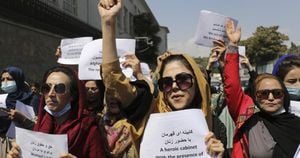The humanitarian crisis in Gaza has reached unprecedented levels, eliciting significant scrutiny over Israel's actions and the flow of aid to the region. While the Biden administration acknowledged some attempts by Israel to improve the situation, many international aid organizations report dire conditions on the ground, likening it to famine as people struggle for food and basic necessities.
On November 12, the Biden administration announced it would not limit arms transfers to Israel, citing limited progress made by the state in enhancing humanitarian assistance to Gaza. State Department spokesman Vedant Patel expressed cautious optimism, noting steps taken by Israel to increase the flow of aid. Still, he emphasized the need for continued improvement and stated, "We want to see the totality of the humanitarian situation improve, and we think some of these steps will allow the conditions for continuing progress."
Despite these assertions, humanitarian groups have conveyed serious concerns. The situation for many residents worsened markedly, with some areas, particularly the northern districts of Gaza, being completely cut off from aid for over a month. Joyce Msuya, the United Nations' acting undersecretary-general for humanitarian affairs, reported at the UN on the deteriorated state of supply access, indicating many have been left without essentials like food, clean water, and medical care.
The tensions over aid access reached new heights when US Secretary of State Antony Blinken imposed a 30-day deadline for Israel to significantly boost the daily deliveries of emergency supplies to Gaza. This ultimatum expired on November 12, drawing sharp criticism from relief organizations who argue conditions have critically deteriorated since the deadline was set. According to reports, aid shipments have plummeted to their lowest levels since the conflict escalated, leaving thousands of people without adequate access to food and basic medical supplies.
Efforts to deliver aid have been impeded not just by logistical issues but also by security concerns. Reports indicate many aid trucks are stranded at the border or unable to reach needed destinations due to the precarious security situation, including threats of theft and military restrictions imposed by Israeli forces. Even when aid deliveries are approved, chaos on the ground often prevents them from being executed properly.
Israel has declared its own measures to facilitate aid, including the opening of new crossing points and resuming distributions. A recent expansion of the coastal humanitarian zone was also announced, purportedly aiming to assist the hundreds of thousands of displaced Palestinians currently residing in tent camps. But humanitarian groups have challenged the effectiveness of these measures. They argue the steps taken have, at best, failed to alleviate the suffering and, at worst, exacerbated it.
This contentious backdrop has compelled various humanitarian organizations to lobby for more substantial actions from the international community and Israel itself. A coalition of eight international aid organizations issued a scathing report asserting Israel had not only failed to meet the stipulated US demands but had also undertaken measures leading to worsened conditions for civilians, particularly emphasizing the plight of those stuck in northern Gaza.
Despite all these challenges, the Biden administration remains firm on its position, framing its arms support to Israel as being contingent on compliance with international humanitarian laws, which mandate humane treatment of civilians. Patel reiterated, "We are not giving Israel a pass," asserting the US's commitment to see improved humanitarian conditions, even as aid organizations voice their apprehensions about the current crisis.
The humanitarian fallout from the 13-month conflict has led to over 43,000 fatalities according to statistics from the Hamas-run health ministry, illuminating the tragic toll on the civilian population. The grave situation continues to spark outrage among observers and human rights advocates who argue the need for immediate and meaningful intervention.
Calls for urgent reforms and substantial international support echo across platforms, as community leaders advocate for leveraging diplomatic channels for enhanced humanitarian assistance. Advocacy for Palestine continues to grow, pushing for not just immediate aid but sustainable solutions to end the conflict.
With the international community closely watching, the coming weeks will be pivotal. Decisions made by both the US and international entities can have significant long-term impacts not just on the immediate flow of aid to Gaza, but on broader peace efforts and the overall humanitarian strategy involved. Amidst these uncertainties, the plight of civilians remains at the forefront of discussions surrounding potential resolutions.



